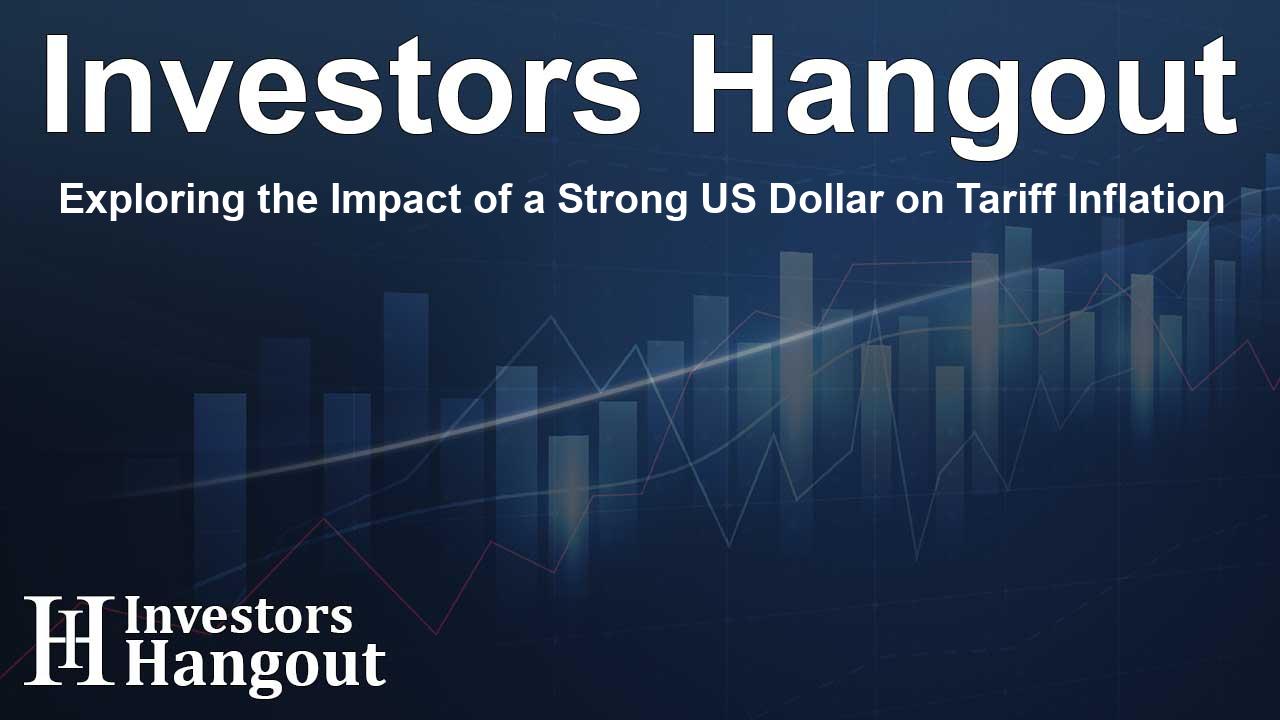Exploring the Impact of a Strong US Dollar on Tariff Inflation

Understanding Tariffs and Their Economic Impact
The ongoing discussions about tariffs implemented during the Trump administration have raised significant concerns among consumers and economists. The tariffs, particularly the 25% levies on imports from certain countries, have instigated a surge in prices across various sectors. When tariffs are imposed, domestic importers face added costs, which they typically pass on to consumers through increased prices on goods. This scenario exacerbates inflation, affecting consumer purchasing power and overall economic stability.
The Relationship Between Tariffs and the US Dollar Strength
Historically, the introduction of tariffs, like the ones proposed by Trump, has shown a tendency to influence the US Dollar Index. For instance, prior to the potential implementation of tariffs on imports, the index saw significant fluctuations as market participants reacted to the news. The anticipation and subsequent announcement of a pause in tariffs resulted in notable movements in the value of the US dollar. A crucial connection exists: higher tariffs often lead to decreased demand for foreign currencies, which can, in turn, bolster the value of the US dollar.
When tariffs restrict imports, they create a ripple effect that leads to a strengthened dollar. As domestic demand shifts toward local goods, the requirement for foreign currency diminishes. This change contributes to the US dollar's rise against other currencies, creating a favorable environment for American consumers and businesses alike.
Mitigating Inflation Through a Strong US Dollar
As the value of the US dollar appreciates, it strengthens the purchasing power of consumers. A stronger dollar typically means American consumers can buy more foreign goods at reduced prices, thus lowering the overall cost of imports. However, when combined with tariffs, the situation becomes more complex. While tariffs increase the cost of imports, the strength of the dollar can offset these rising prices.
This dynamic suggests that the economic forces of a strong dollar and imposed tariffs can balance each other out. In theory, the benefits of a stronger dollar could help mitigate the inflationary pressures caused by higher prices on imported goods.
Interest Rates and Their Connection to Inflation
As inflation rates ascend due to the impact of tariffs, the Federal Reserve may find itself in a position where it needs to intervene to stabilize the economy. A rapid rise in living costs may prompt the Fed to increase interest rates, which directly influences the value of the US dollar, often causing it to rise even further in response. Such a reaction is usually anticipated by the markets, leading to a preemptive appreciation of the dollar.
Considering the United States' stature as the largest importer globally, widespread tariffs can have far-reaching effects on international markets. If a comprehensive tariff strategy were to be executed, it could trigger a decline in global economic growth, prompting investors to seek the relative safety of the US dollar.
Trump's Position on Dollar Strength
Throughout his presidency, Trump’s stance on the value of the US dollar has shifted. Initially criticizing the strong dollar under the Biden administration, he once advocated for a weaker dollar to enhance competitive exporting. However, current perspectives reflect a nuanced understanding, particularly regarding the implications of a strong dollar on the economy.
The Treasury's Stance on Dollar Policy
In line with the administration's recent philosophy, Treasury Secretary Scott Bessent has clearly endorsed a robust US dollar policy. He emphasized the importance of maintaining a strong dollar while cautioning against currency manipulation by other nations. Bessent's comments reinforce the notion that while tariffs may impose challenges, a strategically strong dollar can navigate and alleviate some of these economic anxieties.
Frequently Asked Questions
How do tariffs influence inflation?
Tariffs impose additional costs on imports, which are typically passed on to consumers, resulting in higher prices and contributing to inflation.
What relationship does the US dollar have with tariffs?
Higher tariffs can decrease the demand for foreign currencies, potentially strengthening the US dollar in the market.
Can a strong US dollar help mitigate the effects of tariffs?
Yes, a strong dollar can offset rising import costs due to tariffs, helping to possibly alleviate inflationary pressures.
What might trigger the Federal Reserve to raise interest rates?
If inflation rises sharply, the Federal Reserve may increase interest rates to stabilize the economy, which could further strengthen the US dollar.
Does the current administration favor a strong dollar?
Yes, the current administration, particularly Treasury Secretary Scott Bessent, supports a strong dollar policy as beneficial for the US economy.
About The Author
Contact Caleb Price privately here. Or send an email with ATTN: Caleb Price as the subject to contact@investorshangout.com.
About Investors Hangout
Investors Hangout is a leading online stock forum for financial discussion and learning, offering a wide range of free tools and resources. It draws in traders of all levels, who exchange market knowledge, investigate trading tactics, and keep an eye on industry developments in real time. Featuring financial articles, stock message boards, quotes, charts, company profiles, and live news updates. Through cooperative learning and a wealth of informational resources, it helps users from novices creating their first portfolios to experts honing their techniques. Join Investors Hangout today: https://investorshangout.com/
The content of this article is based on factual, publicly available information and does not represent legal, financial, or investment advice. Investors Hangout does not offer financial advice, and the author is not a licensed financial advisor. Consult a qualified advisor before making any financial or investment decisions based on this article. This article should not be considered advice to purchase, sell, or hold any securities or other investments. If any of the material provided here is inaccurate, please contact us for corrections.
